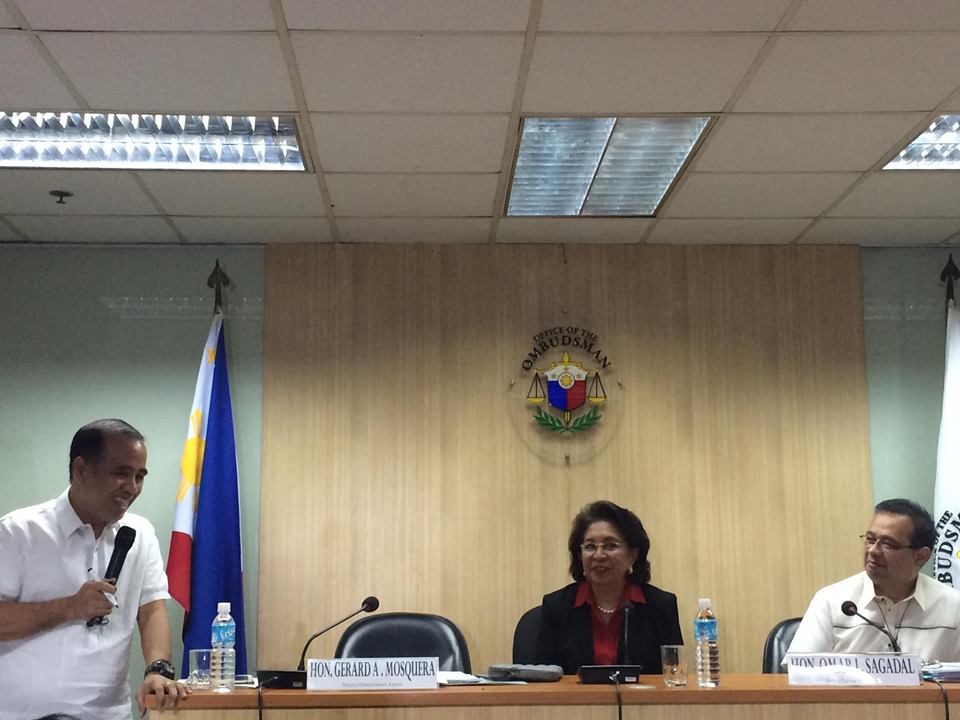SUMMARY
This is AI generated summarization, which may have errors. For context, always refer to the full article.

MANILA, Philippines – After nearly 30 charges dismissed by the anti-graft court Sandiganbayan this year on grounds of delays, the Office of the Ombudsman went on the defensive to explain the prolonged investigations at their level.
In a news conference on Tuesday, April 25, Deputy Ombudsman for Luzon Gerard Mosquera explained that a conflict between doctrines has prompted the Sandiganbayan to drop more cases based on inordinate delay.
The doctrine of inordinate delay is anchored on the constitutional right of an accused to a speedy disposition of his/her cases. From January to April 2017, the anti-graft court has dismissed 26 corruption cases because of delay, including high-profile cases that involved former officials of the Philippine National Construction Corporation (PNCC) who were party to the P6-billion debt agreement with a lending firm.
According to Mosquera, things took a different turn when the Supreme Court (SC) issued in 2013 a ruling on former justice secretary Hernando “Nani” Perez and his $2-million extortion case.
In clearing Perez, the SC laid down a mathematical guideline to determine whether there was delay at the Ombudsman level. As Mosquera explained it, the “Perez doctrine” basically says, count all the years that go as far back as the fact-finding level.
The Ombudsman opposes this counting scheme because for them, fact-finding should be excluded.
“There is no formal case yet at that point. It’s very confidential in nature,” Mosquera said.
The Perez doctrine substantially differed from a doctrine before it – the 2001 “Dela Peña doctrine” which says that the determination of delay should not be quantitative but qualitative.
“It explains that there are delays that are not inordinate. A law student knows this, the strongest defense against a strong case of the government is delay. There are delays that are justified, especially if the delays are caused by the accused. And there are those which are inherently difficult to investigate,” Mosquera said.
Investigating corruption
Mosquera also defended the Office for whatever delay because according to him, “corruption is the most difficult crime to investigate.”
“It is committed in secret. The culprits exert substantial efforts to hide their trail. More often than not, the efforts to hide are funded by the very money that officer has stolen,” Mosquera said.
The Office of the Ombudsman has been affected by the increasing dismissals by the Sandiganbayan on grounds of delay, so much so that it warranted the calling of a news conference on Tuesday.
Before the press conference, the Ombudsman ran to the SC to challenge the doctrine. They filed a petition asking the High Court to revisit, if not reverse, the doctrine. They also asked the SC to order the Sandiganbayan to defer ruling on cases that invoke the delay doctrine. (READ: Ombudsman asks SC to strike down ‘delay’ doctrine)
The Sandiganbayan, to this day, continues to hear motions grounded on delay.
“When we saw recently, especially with the new justices of the Sandiganbayan, they kept dismissing cases, and everyone was using it, that for us was the last straw,” Ombudsman Conchita Carpio-Morales said.
Morales said they will exhaust all legal efforts to pursue the cases already dismissed. “Nothing prevents us from re-filing,” Morales said.
Insufficient evidence
Apart from the delay issue, the Sandiganbayan has also dismissed high-profile cases because of insufficient evidence, the most prominent lately being, former agriculture undersecretary Jocelyn Joc-Joc Bolante who was cleared in the P723-million fertilizer fund scam. (READ: Ombudsman takes Bolante’s plunder case to SC)
Morales took the cudgels for her prosecutors, saying that these cases filed in court were not weak.
“We cannot be reckless, we see to it that when we file a case, we see to it we are loaded with ammunitions to defend our case,” Morales said.
Morales, however, admitted that there is a manpower issue within the office. Sources say high-value prosecutors are being hired as trial court judges.
“We have no complete manpower. It’s difficult to hire lawyers because we’re very strict. I’d rather have 10 lawyers who are competent than 100 lawyers who are insufficient and lazy,” Morales said.
The feisty Morales also took a swipe at Sandiganbayan justices on the pork barrel scam cases against lawmakers. Three years after the filing of charges, no lawmaker has been put on trial.
“Hindi ba ‘yan inordinate delay? Three years ‘yan,” Morales said. (Isn’t that also inordinate delay? That’s 3 years.)
Asked whether they think the Sandiganbayan has been generous to pork barrel scam defendants, particularly former Senator Bong Revilla, who has managed to secure 5 postponements of his trial, Acting Special Prosecutor Omar Sagadal was more safe with his answers, saying the court was merely acting on the motions.
It was Morales who egged Sagadal for a more direct answer, asking his top prosecutor: “Is that fair?”
In the end, Morales said a way to look at it is whether the motions filed by the defense and accepted by the court are meritorious.
These recent events hint at a clash between the Ombudsman and the Sandiganbayan. For that, Morales simply said they will continue to appeal dismissed cases and pursue their petition at the SC. “We have to fight for our cause,” Morales said. – Rappler.com
Add a comment
How does this make you feel?
There are no comments yet. Add your comment to start the conversation.